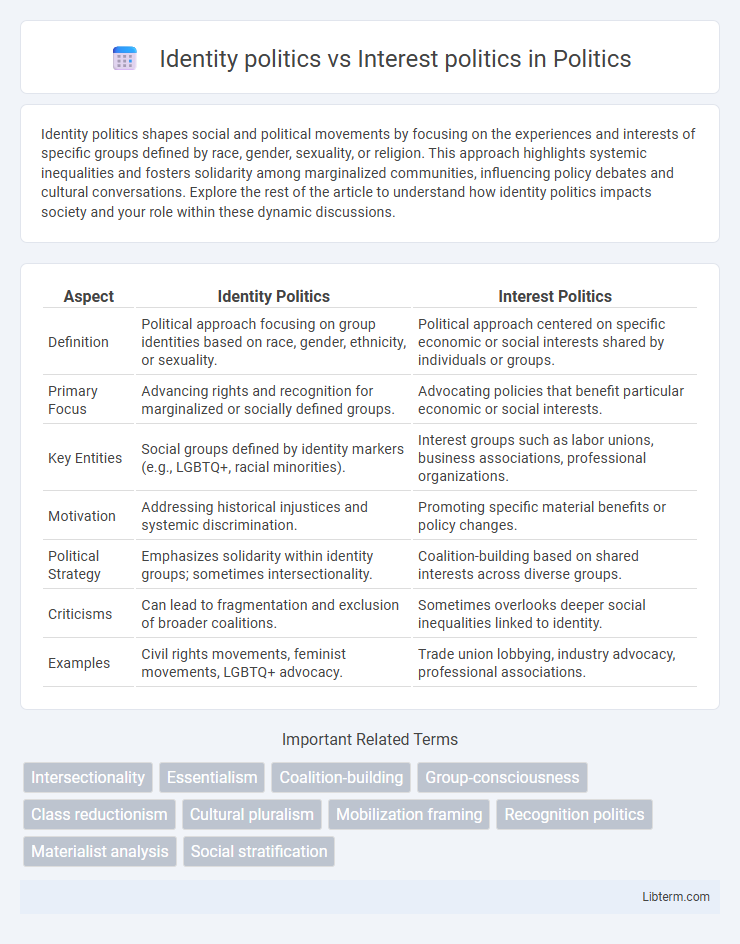Identity politics shapes social and political movements by focusing on the experiences and interests of specific groups defined by race, gender, sexuality, or religion. This approach highlights systemic inequalities and fosters solidarity among marginalized communities, influencing policy debates and cultural conversations. Explore the rest of the article to understand how identity politics impacts society and your role within these dynamic discussions.
Table of Comparison
| Aspect | Identity Politics | Interest Politics |
|---|---|---|
| Definition | Political approach focusing on group identities based on race, gender, ethnicity, or sexuality. | Political approach centered on specific economic or social interests shared by individuals or groups. |
| Primary Focus | Advancing rights and recognition for marginalized or socially defined groups. | Advocating policies that benefit particular economic or social interests. |
| Key Entities | Social groups defined by identity markers (e.g., LGBTQ+, racial minorities). | Interest groups such as labor unions, business associations, professional organizations. |
| Motivation | Addressing historical injustices and systemic discrimination. | Promoting specific material benefits or policy changes. |
| Political Strategy | Emphasizes solidarity within identity groups; sometimes intersectionality. | Coalition-building based on shared interests across diverse groups. |
| Criticisms | Can lead to fragmentation and exclusion of broader coalitions. | Sometimes overlooks deeper social inequalities linked to identity. |
| Examples | Civil rights movements, feminist movements, LGBTQ+ advocacy. | Trade union lobbying, industry advocacy, professional associations. |
Understanding Identity Politics: Definition and Origins
Identity politics centers on individuals' affiliations with social groups based on race, ethnicity, gender, sexuality, or religion, emphasizing shared experiences and collective rights. Originating from civil rights movements and feminist activism in the mid-20th century, identity politics challenges traditional class-based politics by foregrounding cultural and social recognition. This approach highlights systemic inequalities and aims to address oppression rooted in social identity categories rather than purely economic interests.
Interest Politics Explained: Focus on Shared Goals
Interest politics centers on mobilizing groups around shared goals and common interests rather than personal or cultural identities. It emphasizes policy outcomes and pragmatic solutions that benefit collective economic, social, or political objectives. By focusing on concrete issues like healthcare, education, or labor rights, interest politics fosters cross-sectional alliances and pragmatic cooperation.
Key Differences Between Identity and Interest Politics
Identity politics centers on social groups defined by race, gender, ethnicity, or sexuality, emphasizing shared experiences and cultural recognition. Interest politics prioritizes collective goals based on economic class, professional affiliations, or policy objectives, focusing on common material benefits and pragmatic cooperation. While identity politics seeks empowerment through recognition and justice for marginalized groups, interest politics works toward achieving tangible policy outcomes through negotiation and coalition-building.
Historical Context: Evolution of Political Engagement
Identity politics emerged prominently during the Civil Rights Movement and feminist movements in the 1960s and 1970s, emphasizing group-based experiences tied to race, gender, and sexuality. Interest politics has roots in earlier political traditions, dating back to the formation of labor unions and trade associations in the 19th century, focusing on economic and class-based interests. Both frameworks have evolved to shape contemporary political engagement by addressing either collective identities or specific material concerns.
Advantages of Identity-Based Mobilization
Identity-based mobilization strengthens political engagement by fostering a sense of belonging and shared experience among group members, enhancing solidarity and collective action. It amplifies historically marginalized voices, ensuring that unique cultural, social, and economic concerns receive focused attention in policy-making processes. This targeted approach often leads to increased visibility and empowerment, driving social change and promoting equity within diverse societies.
Strengths of Interest-Based Political Action
Interest-based political action effectively mobilizes individuals around specific, tangible goals, fostering focused advocacy and policy influence. It enables coalitions across diverse identity groups to unite on common economic or social interests, increasing the potential for legislative success. The emphasis on pragmatic solutions often results in measurable outcomes and sustained political engagement.
Criticisms and Controversies Surrounding Identity Politics
Identity politics faces criticism for emphasizing group identity over common goals, potentially deepening societal divisions and hindering broad-based coalitions. Critics argue it risks essentializing individuals, reducing complex identities to singular categories that may fuel exclusion or conflict. The debate often contrasts interest politics, which prioritizes shared material concerns and pragmatic policy goals, with identity-based movements that focus on cultural recognition and social justice.
The Role of Intersectionality in Modern Politics
Identity politics emphasizes the unique experiences of groups defined by race, gender, or sexuality, while interest politics centers on shared economic or policy goals. Intersectionality reveals how overlapping social identities, such as race and gender, create complex systems of oppression and privilege that both identity and interest politics must address. Modern political strategies increasingly incorporate intersectional analysis to develop more inclusive policies that recognize multifaceted identities beyond singular group affiliations.
Real-World Examples: Identity vs Interest Movements
Identity politics often centers around shared characteristics such as race, gender, or ethnicity, exemplified by the Civil Rights Movement advocating for African American rights and the LGBTQ+ rights movement seeking equality based on sexual orientation and gender identity. Interest politics, in contrast, focuses on specific economic or policy goals, as seen in labor unions fighting for workers' rights or environmental groups pushing for climate change legislation. Real-world examples highlight how identity movements mobilize communities around cultural recognition, while interest movements emphasize collective benefits tied to economic or policy interests.
Future Trends: Balancing Identity and Interest in Political Strategy
Future trends in political strategy highlight a growing balance between identity politics, centered on race, gender, and cultural recognition, and interest politics, which prioritizes economic and policy-based group goals. Political actors increasingly leverage data analytics and social media platforms to target voters' multiple identities while addressing their material concerns, creating hybrid approaches that blend emotional resonance with pragmatic solutions. This convergence aims to foster inclusivity without fragmenting policy agendas, influencing campaign strategies and governance models going forward.
Identity politics Infographic

 libterm.com
libterm.com